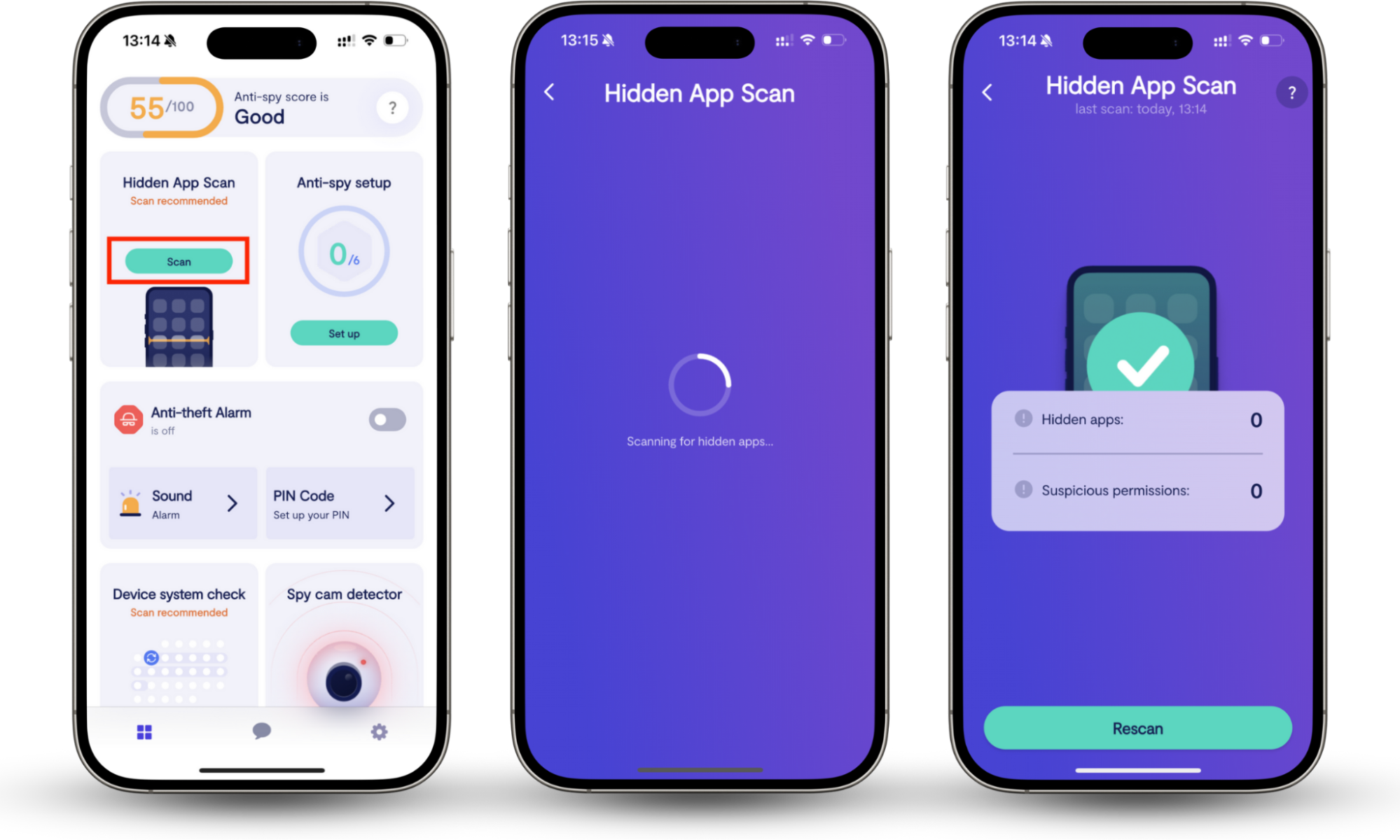Table of contents
- Is AI really spying on us
- What kind of data does AI collect
- Is it legal for AI to collect your data
- How AI can be used to spy on you
- 1. Data Collection in digital space
- 2. Surveillance via devices and sensors
- 3. Workplace surveillance
- Risks of AI spying
- How to protect yourself from AI surveillance
- Conclusion
Is AI really spying on us
Artificial intelligence isn't sentient, so it doesn't make decisions or snoop on people by itself. However, humans can use AI algorithms to monitor others.
When people talk about AI spying, they usually mean how companies, governments, or individuals use AI to collect and analyze huge amounts of personal data.
To learn more about AI, check our guide, “What is artificial intelligence and how does it work?”
What kind of data does AI collect
Artificial intelligence is built into smart assistants, gadgets, social media, and other apps, which can collect various forms of data as you interact with them. This is usually done to personalize and enhance these services, but your data could also be misused or shared with third parties.
Common data types that AI collects include:
- Voice recordings: Smart assistants like Siri, Alexa, and Google Assistant capture wake words and may also record short snippets after activation to improve their response. However, there have also been instances where these assistants have recorded conversations even when they shouldn't—we've covered this in depth in our guide, "Does Google Assistant spy on you?"
- Facial recognition data: Collecting and analyzing facial biometric patterns allow security systems and social media apps to profile and identify people. This has also begun happening in public spaces—for example, Dubai International Airport recently unveiled an AI-powered corridor that relies on facial recognition to speed up immigration times.
- Location data: Apps such as Google Maps and Uber collect GPS and Wi-Fi location information so that built-in AI algorithms can use the data to optimize routes and predict traffic patterns.
- Device usage: AI can track how often you use certain apps, when you're active, how fast you type, etc. For example, iOS relies on machine learning (via the iPhone's neural processing unit) to seamlessly collect and analyze your data for predictive text, battery optimization, app suggestions, and general system performance.
- Social media activity: Likes, comments, messages, followers interactions, etc., are collected by platforms such as Instagram, Facebook, and TikTok. AI analyzes this data to understand your preferences and deliver targeted ads and personalized content.
- Smart home data: Smart devices like TVs, thermostats, and security cams learn your routines and habits to improve how they work. For example, robot vacuums—e.g., iRobot Roomba, Shark, and Eufy—use AI-driven LiDAR or VSLAM navigation to map your home and optimize cleaning paths.
With so many apps quietly collecting data, it's getting harder to tell which ones are safe, especially with AI algorithms making tracking and profiling more sophisticated than ever. That's where Clario Anti Spy comes in.
Built by cybersecurity experts, this anti-spyware solution detects privacy-invasive apps, including those powered by AI, that monitor your behavior or gather data without your knowledge. You can run a Hidden App Scan to detect these apps.
Here's how to scan your phone with Clario Anti Spy:
- Download Clario Anti Spy and subscribe to create an account.
- Tap Scan under Hidden App Scan.
- Review anything the scan finds and delete what you don't recognize.

Clario Anti Spy doesn't just detect threats. It also provides 24/7 expert support and gives your phone a security score. If the score is low, you can use the Anti-spy setup to boost your privacy. A Clario expert recently helped a customer with a low security score and had this to say:
"One of our users reached out, confused about why their Clario Anti Spy score was so low. They thought having the app was enough, but weren’t aware that the score actually reflects how actively you practice security online based on your settings. Together, we reviewed their scan results and fixed a few privacy issues right away. Then we helped them turn on all available Clario tools and apply the key anti-spy recommendations.
We also made sure they had critical alerts enabled, so they wouldn’t miss anything important. Finally, we showed them how to regularly check for spyware apps—a small habit that makes a big difference. Within days, their score improved noticeably, and they felt much more secure. It’s a reminder that digital safety isn’t passive—it’s something you build, step by step."
Is it legal for AI to collect your data
Most of the time, when you use an app, visit a website, or interact with a smart device, you're agreeing to a privacy policy or terms of service. These agreements often include clauses that allow the app, website, or device to collect and process information. Because you've given consent, it's usually legal for AI-powered tools to collect, store, and use your data.
AI data collection is usually legal if the app or service is:
- Getting your consent or requesting permissions openly: Apps typically explain their data collection in privacy policies or ask for explicit permissions through pop-ups for things like location, camera, or microphone access.
- Anonymizing and grouping your data: Your data is stripped of personal identifiers or combined with others so it cannot be linked back to you.
- Using your data to deliver the service: Social media and streaming apps often use AI to recommend content based on your activity, which is usually covered by the agreements you accept when signing up.
However, there are still gray areas. Some apps make consent vague, hidden, or confusing. Others collect more data than is necessary to provide the service or share your information with third parties without clearly explaining why or how it's used. Some even trick you into granting permissions such as constant access to your location, microphone, or camera.
That's why certain countries and regions have strong privacy laws designed to give users more control over their data. Regions with strong privacy laws include:
- GDPR (European Union): Companies must get clear consent before collecting data and can only gather what is needed for the service to work. Users can also contact an organization and submit a request to delete their personal data.
- CCPA (California): Gives users the right to see what data is collected, opt out of data sales, and delete their data through a verified online request.
- PIPEDA (Canada): Requires meaningful consent and limits data collection to what is necessary to provide the service. Users can access, correct, or delete their data by contacting the organization.
- PDPA (Singapore): Companies must seek explicit consent from users and explain why data is collected. Personal data can be deleted upon request, but an organization may keep some data if legally required.
How AI can be used to spy on you
AI isn't sneaking around spying on you on its own. However, its ability to analyze massive amounts of data makes it a powerful tool for surveillance when used by governments, companies, or employers. By combining pattern detection and big data analytics, AI can track behaviors, make predictions, and draw conclusions about you in ways you may not realize.
1. Data Collection in digital space
AI algorithms constantly scan and process what you do online. Platforms like Google, Facebook, TikTok, and Amazon use AI to:
- Track search history, clicks, and browsing behavior
- Analyze video watch patterns and content preferences
- Build predictive profiles about your interests, habits, and emotional triggers
For example, TikTok's AI studies how long you pause on a video and uses that data to refine its recommendations. Similarly, Google collects search and activity data to personalize ads across its ecosystem of services.
2. Surveillance via devices and sensors
Smartphones, laptops, smart TVs, and home assistants all contain microphones, cameras, and motion sensors. AI can use this tech to:
- Recognize voice commands and background noise
- Detect faces and expressions for unlocking devices or tagging people in photos
- Monitor movement patterns to track location or activity
For instance:
- Amazon Alexa and Google Assistant process your voice inputs to respond to commands.
- Apple's Face ID uses AI-powered facial recognition to verify your identity.
- Many smart TVs use automatic content recognition to capture what you're watching.
3. Workplace surveillance
AI-powered monitoring tools are becoming more common in workplaces as employers look for ways to track productivity and maintain security. These AI systems can:
- Log keystrokes and browsing activity
- Monitor employees via webcams
- Analyze tone, sentiment, and facial expressions during calls
- Scan messages and emails for certain keywords or patterns
Recently, Elon Musk's AI startup xAI drew attention after reports suggested it required employees to install monitoring software on their personal laptops. The software reportedly tracked keystrokes, browsing activity, and usage patterns to improve internal security and prevent leaks.
Risks of AI spying
AI itself doesn't make decisions, but how companies, governments, and other groups use AI can greatly affect individuals and society.
For instance, AI can:
- Learn a lot about you: The more data AI collects, the more it knows. Over time, your browsing history, app usage habits, and location patterns can reveal personal details such as your habits, health issues, finances, and even personal relationships. This gives companies a detailed behavioral profile that could be used to influence their decisions.
- Shape your decisions: AI-driven targeted ads and personalized news feeds can influence your choices without you realizing it. For example, Facebook's algorithm tracks your activity and uses AI to decide which posts, ads, or articles you're most likely to engage with. Marketers then use these insights to nudge your buying decisions, showing products or services when you're most likely to act. While AI can't directly tell you what to do, it can strongly influence your opinions and purchases.
- Put your private data at risk: Since AI systems rely on data, things can go wrong if that data isn't handled responsibly. Sensitive information like private messages, health records, or location history could end up in the wrong hands. This can happen through data breaches, malicious apps tricking users into granting permissions, or companies selling your data without clear consent. There have also been cases where AI-related features led to unintended privacy issues, such as Google and other search engines indexing shared ChatGPT conversations that contained personal information (OpenAI has since disabled this feature).
- Impact society as a whole: When governments or big tech companies use AI to monitor people at scale, it can lead to a loss of trust in institutions, limit free speech by making people feel constantly watched, and shift power toward those controlling the data.
How to protect yourself from AI surveillance
Although you can't completely stop AI-powered systems from collecting data, good privacy hygiene can go a long way toward limiting what they get to know about you.
Here's how you can protect your privacy:
- Use privacy-focused browsers and ad blockers: Switch to browsers like Brave or Firefox, and install reliable ad and tracker blockers. These tools help reduce how much data websites and advertisers can collect about your browsing habits.
- Turn off unnecessary microphone and camera access: Disable mic or camera access for apps that don't actually need them. For example, a photo-editing app shouldn't require constant microphone access.
- Manage ad personalization settings: Platforms like Google, Facebook, and Instagram track your activity to serve targeted ads. Adjusting your ad preferences in their settings to control how much they learn about you. For example, on Google, you can go to My Ad Center and turn off ad personalization to limit tracking.
- Be mindful of what you share online: Avoid oversharing personal details like your home address, travel plans, or private photos on social media. Cybercriminals often use this data for targeted attacks—for more information, check our guide on how spear phishing works.
- Review app permissions regularly: Many apps ask for permissions they don't need, such as access to your location or contacts. Check these settings often and revoke anything unnecessary. If you end up finding what could be potential spyware, check our guide on how to stop someone from spying on your phone.
- Limit always-on smart devices: Smart speakers, cameras, and other "always listening" gadgets can collect audio or behavioral data. Keep them out of bedrooms or other private spaces if you're concerned about privacy.
- Use Clario Anti Spy’s Anti Spy: Our anti-spyware solution helps you detect hidden apps and boosts your phone’s overall privacy with its built-in Anti-spy setup.
Conclusion
AI isn't spying on you by itself. It's just a tool, and it only does what people or businesses program it to do. The real concern is how companies, advertisers, or employers use AI to collect and analyze your data. With enough access, AI-powered systems can track, profile, and even influence you without you noticing.
That's why protecting your personal information matters. Clario Anti Spy features like Hidden apps scan and Anti-spy setup can help you detect and remove privacy-invasive apps while also improving your phone's overall privacy and security.


